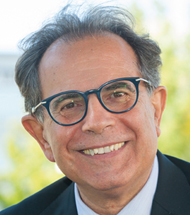"There are no secrets: just good ideas, work hard work and perseverance."
Avelino Corma was the first guest of the José María Albareda Lectures.

PHOTO: Manuel Castells
The degree program of Avelino Corma (Castellón, 1951) took a giant leap forward when, in 1989, CEPSA industrialized his patent on zeolites applied to hydrocarbon refining to improve the octane rating of its gasoline. With this boost, he started up the high school de Tecnología Chemistry in Valencia. And he fulfilled two dreams in one: to have a center for research into the application of zeolites in fields such as biomass, medicine or pharmacology; and to return to his homeland part of what he had achieved thanks to the scholarships he received as a student. So far his work has brought him more than one hundred and fifty patents and a high school with nearly two hundred researchers. He has spoken about all this in the prestigious Faraday Discussion, a forum to which it is almost a requirement attend to receive a award Nobel.
For the layman on subject, tell us, what are catalysts?
Catalysts are materials or molecules whose goal purpose is to carry out the reactions Chemistry at a higher speed and, in addition, to direct them towards the desired product, so as to avoid the training of by-products that are of no interest.
What about zeolites, to which he has devoted a large part of his professional life?
Zeolites have the peculiarity that they allow, to a certain extent, to control the size of their pores. They can act as molecular sieves and select, from among several molecules, which ones will penetrate the pores, find the active centers and react. On final, they represent an optimal way to increase the university entrance exam to the desired product.
Was its application in the world of hydrocarbons the core topic for the team's impulse?
In the first stage it was, no doubt, but now we have other Chemistry projects that are becoming very relevant, in biomedicine and in alternative energy sources such as biomass.
Perhaps because the automotive industry is exploring other energy sources, such as electric cars?
Forecasts for the next fifteen to twenty years indicate that fossil fuels will continue to be the main source of energy source . However, others such as wind and solar energy will increase their energy quotas and will gradually become an alternative to traditional fuels.
In spite of the advances, a certain social perception has spread that we pollute more and more, and that the Chemistry is partly to blame...
In this we can be categorical: the Chemistry does not pollute. In any case, it would pollute if we misuse it. If we respect the laws and regulations, if we develop increasingly cleaner processes, it is thanks to the Chemistry well done.
Our standard of living would be impossible without it. If it were not for Chemistry, patients with infectious diseases would not survive. Not only that, but it would be impossible to control its spread. On another front, the boom in agriculture - which feeds a large part of the planet's six billion inhabitants - has only been possible with the introduction of synthetic fertilizers.
And, of course, we would not have reached this level of development without fossil fuels. If we look back, only forty or fifty years ago, we used to obtain energy by burning large quantities of wood. Would it have been more sustainable to continue on that path or would it have been better to achieve development from hydrocarbon refining? This is what Chemistry and engineering have allowed.
So why do you think it has a bad reputation?
First of all, it is very easy to put all the blame on Chemistry, although many of these accusations do not hold water. I repeat that Chemistry is precisely the science that has boosted our standard of living. It is true that improper use can lead to problems, but the same is true of nuclear power, for example. Nuclear sources have rendered great services to mankind - both for energy supply and from a medical point of view. However, we already know what happens if it is misused or if the necessary precautions are not taken to control it.
According to HCR, and you have published more than 900 journal articles. How did you reach this level of publication from basic science?
It has not been easy result . When I look back I realize that in my life what I have done has been mainly to work. I have also been lucky to be surrounded by very good collaborators who have believed in project. In the end, there are no secrets: it's about having good ideas, working hard and persevering.
With this formula, he has registered more than 150 patents. Is patentability a good system for science to advance?
They are not at odds with each other. We do research to find new solutions to scientific problems or questions that arise. It is essential that work is published so that other scientific groups can access it. The patent also protects the breakthrough, which may have had a very high cost. It is common for companies, when they invest heavily in research, to want to safeguard the results. Otherwise, they would reach their competitors without the latter having invested anything.
link to the full interview in Nuestro Tiempo(.pdf)
